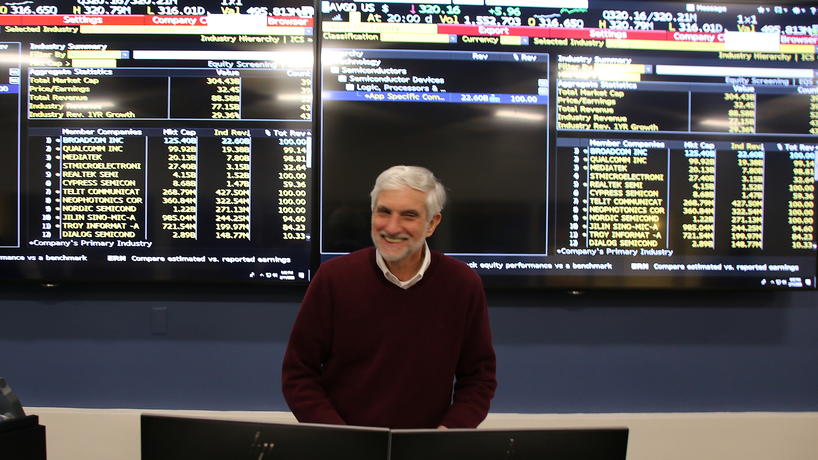
This article was originally published on April 6, 2020.
The College of Business Investment Fund Management course is designed to teach investment approaches and analytical techniques. Tasked with managing the assets in the COB investment fund, upper-level UM-Dearborn students work with a faculty adviser to make money by choosing the best stock options.
When the fund saw double-digit percentage gains only months after starting it, Reporter joined the class in mid-February to see how the money magic happens. Advised by Finance Lecturer Nick Vlisides — who spent 30-plus years in corporate finance — the highly engaged finance students debated whether to buy, sell or hold stocks based on three-to-five-year projection analysis. Vlisides, who’s gathering investment materials to create a class library, had students review books from authors like Warren Buffett and Benjamin Graham. Guest speakers in past classes include professors from U-M’s Ross Business School and staff from Bloomberg Professional Services.
It was clear that the portfolio’s strength is tied to Vlisides’ teaching style — he’s affable, encouraging and offers opportunities for different perspectives. He then shows students how to make investment decisions based on prediction models, research and analytical thinking.
But what happens when even the most prepared are faced with uncertainty? Shortly after visiting the class, a then seemingly faroff Coronavirus pandemic found its way here, a bull market turned into a bear market — meaning there was a 20-percent value decline in stocks — and all college courses went virtual to comply with government-imposed social distance orders. We checked in with Vlisides and the class in early April to see how it was going.
“This is not how I pictured the last semester of college,” says senior Vivian Dinh, a finance major. “There’s a global pandemic. We’re stuck in the house. Commencement was canceled. The stock market felt like it was in a free fall. But I’m so glad to be in this class at this time.
“Professor Vlisides keeps providing advice to us about how to view the stock market and how to move forward ourselves. When I look back, that’s what I’ll remember.”
Here are a few lessons Vlisides has shared with the class.

Information needs to come before action.
In a February session, students did their weekly stock updates. Each student had five minutes to talk about what to sell, what to buy and what projection models showed. Everything was doing well (the Dow Jones’ all-time highest closing record happened Feb. 12) and students documented the gains they had. It was all good news, but Vlisides — looking at news reports from the finance lab’s Bloomberg Terminals — told his class, “Let’s keep an eye on what’s happening in Wuhan.”
Students then talked about stocks that would perform well if COVID-19 was as concerning as news outlets were reporting. The class figured their single Amazon share would do well if delivery to homes became essential. When Vlisides noticed that Amazon shares had a price dip in February, the class voted to buy another share of the stock. “If you are working with investments — yours or someone else’s — it’s important to do your research before you act.”
A month later, the stock market is volatile. But Vlisides’ message is consistent.
“Let information be your guide, not fear. If you don’t have a clear picture of what you are looking at, wait until you get the information needed to make a good decision.”
In early April, Dinh said Vlisides is advising the class to continue to monitor their stocks closely, but hold on making changes to the Student-Managed-Investment-Fund. She says it’s been a smart move — since their losses the week of March 16, the fund has already begun to rebound.
We’re all in this together.
Even before the stock market hit historic lows in March, Vlisides cautioned the class that the market was predicted to take a downturn.
“When it does, you need to remember that you aren’t alone,” he said. “When the market is down, everyone feels it — your family, neighbors, even Warren Buffett.”
In March, Vlisides said no one could have predicted the reason for the current financial crisis and how it is unfolding, but he’s confident that all sectors will work together to help correct the market.
“The coronavirus and the impact it’s had is international. Nations are shutting down. It’s affecting every industry. Remember that everyone wants to minimize the impact of this,” he said. “It’s definitely a crisis, but in crisis comes opportunity. If we remember that we are all in this together, maybe this is a point in history we’ll look back and say, ‘that was a time when we did things right.’”
Don’t get stuck in the daily setbacks, instead, look long-term.
During their first online class, Vlisides spent the session charting depressions, recessions and how long the economic recovery took.
Recovery from the Black Monday in 1987 took two years. The 2001 recession was nine months. The late 2000s Great Recession totalled six years.
“Fundamentally, what we are experiencing now isn’t caused by an economic issue, so I’m hopeful that there will be a quicker recovery. This isn’t happening because we are overfinanced or credit-stressed or in a dot-com bubble,” he said. “However, the longer this goes on, the uglier it could look from an economic perspective with business closures (due to social distance orders); I don’t want to diminish that and the impact that has on people’s lives. But it’s important to remember that we’ve come out of every recession we’ve been in. I’m not saying we are in a recession right now. But, when we do find ourselves in one, know that we’ll come out of it.”
When looking at the stock market, Vlisides tells the class to go beyond today’s numbers because portfolios are a long-term investment. “Today’s numbers matter if you are selling today. Otherwise, look to the future — history tells us the market will rebound.”



